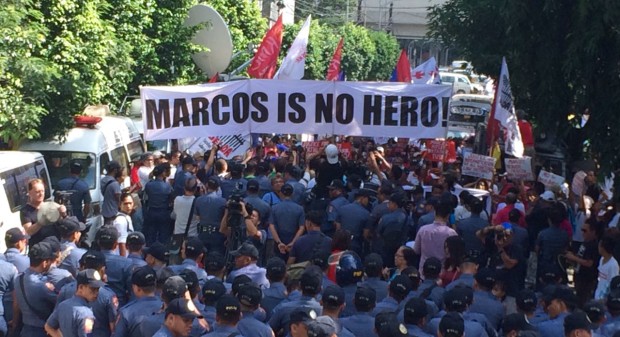
Protesters against the burial of former President Ferdinand Marcos at the Libingan ng mga Bayani are blocked by layers of police personnel near the Supreme Court Nov. 8, 2016 as they wait for its ruling on the case. Inquirer/L. Rillon
Supreme Court Chief Justice Maria Lourdes Sereno, among those who voted against junking the petitions opposing the burial of Ferdinand Marcos at the Libingan ng mga Bayani, said in her dissenting opinion that President Rodrigo Duterte ‘acted with grave abuse of discretion’ in ordering the hero’s burial for the late dictator. Sereno maintained that ordering the interment of Marcos’ remains at the LNMB “violated domestic law and international law in relation to the obligations to do justice for human rights victims.”
READ: SC: ‘No grave abuse of discretion’ by Duterte on Marcos burial
Here’s a summary of Sereno’s opinion as released by the SC public information office:
Chief Justice Maria Lourdes P. A. Sereno, in her dissent, affirmed that the Court must take cognizance of the issues presented in order to preserve the Constitution as well as the judiciary’s own prerogatives under the Constitution. She maintained that the President acted with grave abuse of discretion in ordering the interment at LNMB because it violated domestic law and international law in relation to the obligations to do justice for human rights victims. After a review of the applicable international agreements and protocols, the Chief Justice pointed out that the Philippines is bound to affirmatively protect the rights of the human rights victims under martial law by providing effective reparations, which would include monetary compensation as well as non-monetary remedies (such as symbolic reparation). The Chief Justice pointed out that the interment of the Marcos remains at LNMB would be the antithesis of symbolic reparation. She also pointed out that the interment would run counter to the duty to combat impunity as well as to preserve memory—all of which are international commitments that the Philippines is bound to observe.
The Chief Justice pointed out that the interment of the Marcos remains at LNMB would be the antithesis of symbolic reparation. She also pointed out that the interment would run counter to the duty to combat impunity as well as to preserve memory—all of which are international commitments that the Philippines is bound to observe.
The Chief Justice also took exception to the majority’s position that the interment would serve a public purpose, thus justifying the use of public funds. She maintained that the recognition by both branches of government—the legislative and judicial—that Marcos was a dictator, plunderer and a human rights violator would preclude the interment at LNMB as such act would run counter to the original intention of the LNMB. The invocation that the interment at LNMB would bring about national unity and healing, by itself, is insufficient to justify the use of public funds absent a public purpose.
Ending her dissent, the Chief Justice wrote that:
“Respondents may deny the implications of their actions today, but the symbolism of the burial will outlive even their most emphatic refutations. Long after the clarifications made by this administration have been forgotten, the gravesite at the LNMB will remain. That is the peculiar power of symbols in the public landscape—they are not only carriers of meaning but are repositories of public memory and ultimately, history.
For the Court to pretend that the present dispute is a simple question of the entitlement of a soldier to a military burial is to take a regrettably myopic view of the controversy. It would be to disregard historical truths and legal principles that persist after death. As important, it would be to degrade the State’s duty to recognize the pain of countless victims of Marcos and Martial Law. Regardless of the promised national unity that the proposed burial will bring, I cannot, in good conscience, support such an expedient and shortsighted view of Philippine history.”
For the Court to pretend that the present dispute is a simple question of the entitlement of a soldier to a military burial is to take a regrettably myopic view of the controversy. It would be to disregard historical truths and legal principles that persist after death. As important, it would be to degrade the State’s duty to recognize the pain of countless victims of Marcos and Martial Law.
READ: SC votes, 9-5, for burial of Marcos at Libingan
The high tribunal voted 9-5 with one abstention to dismiss the petition filed by anti-Marcos groups and personalities to block the President’s order. CDG